14 spots for the best, comforting fish soup in Singapore

- 1. Mei Xiang Black and White Fish Soup
- 2. Bukit Merah 127 Fish Soup Stall
- 3. Hong Kong Street Chun Kee
- 4. Hong Kong Street Zhen Ji
- 5. Jin Hua Fish Head Bee Hoon
- 6. Piao Ji Fish Porridge
- 7. Blanco Court Fresh Fish Soup
- 8. Jun Yuan House of Fish
- 9. Kwang Kee Teochew Fish Porridge
- 10. Angel Horse Teochew Fish Soup
- 11. Han Kee
- 12. Hot Spot Cafe Restaurant
- 13. Lin Ji Fish Soup and Porridge
- 14. Arcade Fish Soup
When it comes to Singaporean comfort food, fish soup takes the cake. It’s a deceptively simple yet satisfying dish, perfect for rainy day cravings or post-hangover recovery.
There are many kinds of fish soup in Singapore, but they can mostly be categorised into two styles: Teochew and Singaporean-Cantonese.
The former presents a bowl of hazy, darker-coloured soup with batang fish slices, and typically features a plethora of ingredients like tomato wedges, tofu cubes and lettuce. This style of fish soup often has a slight tang, but is always robust with ti po (dried sole fish) flavour.
As for the Cantonese-Singaporean version, the milky, white broth derived from the gelatin dissolution in the fish bones, is usually dressed simply with one type of vegetable. Occasionally, milk is added to enhance the creaminess of the broth.
Despite their distinct flavours, both styles embody a labour of love, echoing Anthony Bourdain’s profound sentiment: “Good food is very often, even most often, simple food.”
In this guide, we bring you 14 spots to savour some good fish soup in Singapore, guaranteed to soothe the soul.
1. Mei Xiang Black and White Fish Soup
Stall 44, Berseh Food Centre, 166 Jalan Besar
Open: Monday to Friday (11.30am to 2pm)

Why visit? Despite having a two-and-a-half hour opening window on weekdays, Mei Xiang Black and White Fish Soup still manages to attract a steady queue of patrons for its delectable stock.
After having served the same dish for over two decades, the elderly couple behind the brand have since streamlined Mei Xiang’s menu, offering just one menu item comprising fish soup and rice, with optional minor add-ons.
The simplicity of its ordering system means that the queue moves fast. Yet, its popularity often results in the stall selling out even before closing time, so arrive early to avoid disappointment.
Crowd favourites: Here, you only have to decide how many sets you want to get as there’s only one menu item — the black and white fish set (S$6.50) comes with a hearty broth, rendered rich and cloudy from hours of simmering, and features a combination of crispy deep fried “black” fish and fresh “white” fish within. Its chilli is also known to pack a punch.
2. Bukit Merah 127 Fish Soup Stall
127 Bukit Merah Lane 1
Open: Monday to Friday (7am to 10am, 11am to 2pm)
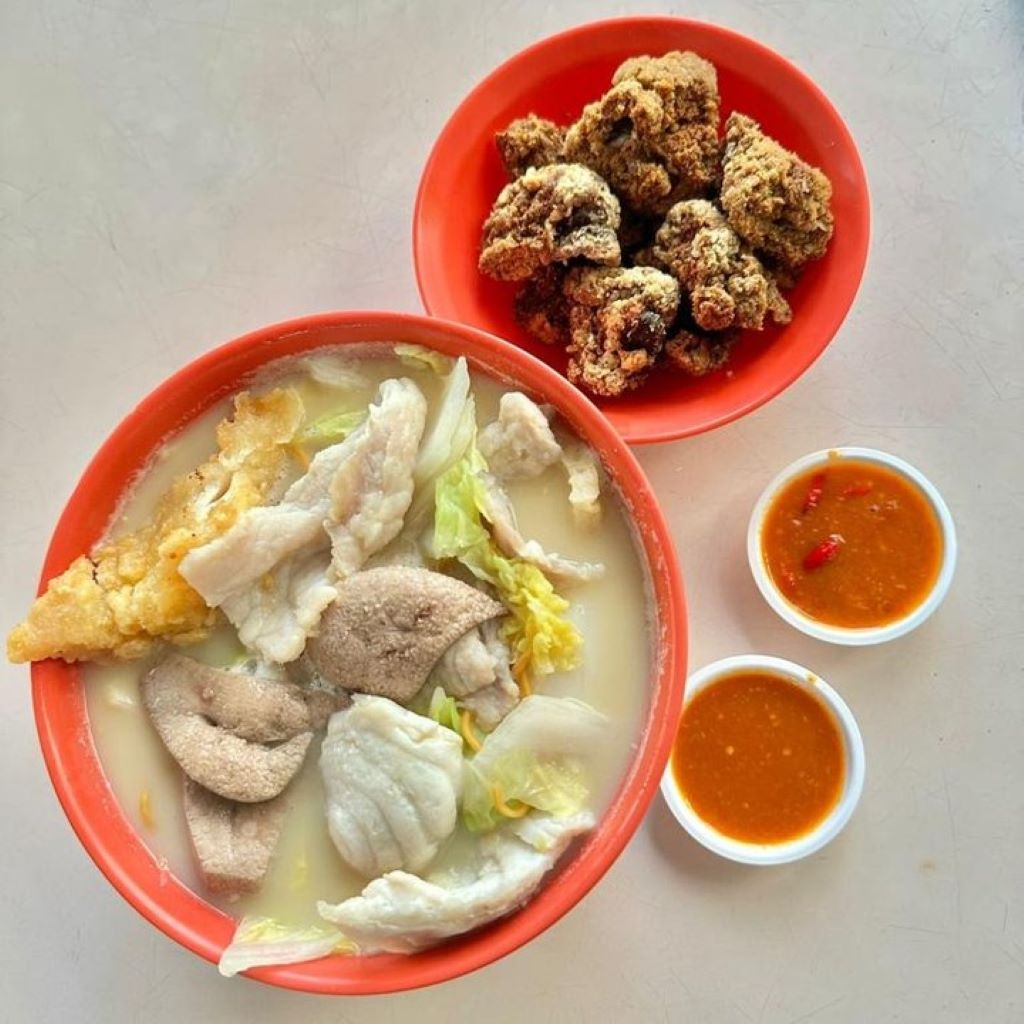
Why visit? Bukit Merah 127 Fish Soup Stall is a modest kopitiam stall specialising in fish soup with just a simple yellow sign board listing its concise menu of four dishes. This hidden gem is a well-kept secret amongst regular patrons, who tout it to be the best fish soup in Singapore
The stall’s fame is evident in the enduring queues that can stretch up to over an hour long. However, as of September of last year, the elderly owners have retired. A young couple has since taken over the stall, ensuring that the same hearty bowl that has satisfied palates continues to be savoured for years to come.
Crowd favourites: When you get a bowl of fish soup (S$5.50), you get to choose from sliced fish, fried fish or a combination of both. However the fried fish is our recommendation — the perfectly golden batter remains crisp even after being doused in the soup.
What distinguishes this stall from others is its stock, which comes a shade darker than typical fish soup. Robust, savoury and subtly sweet, the soup carries a slight tang from the salted vegetables — it’s a delightful combination and the mainstay of the stall.
3. Hong Kong Street Chun Kee
125 Bukit Merah Lane 1, 01-190
Open: Monday to Sunday (11am to 2.30pm, 5pm to 10.30pm)
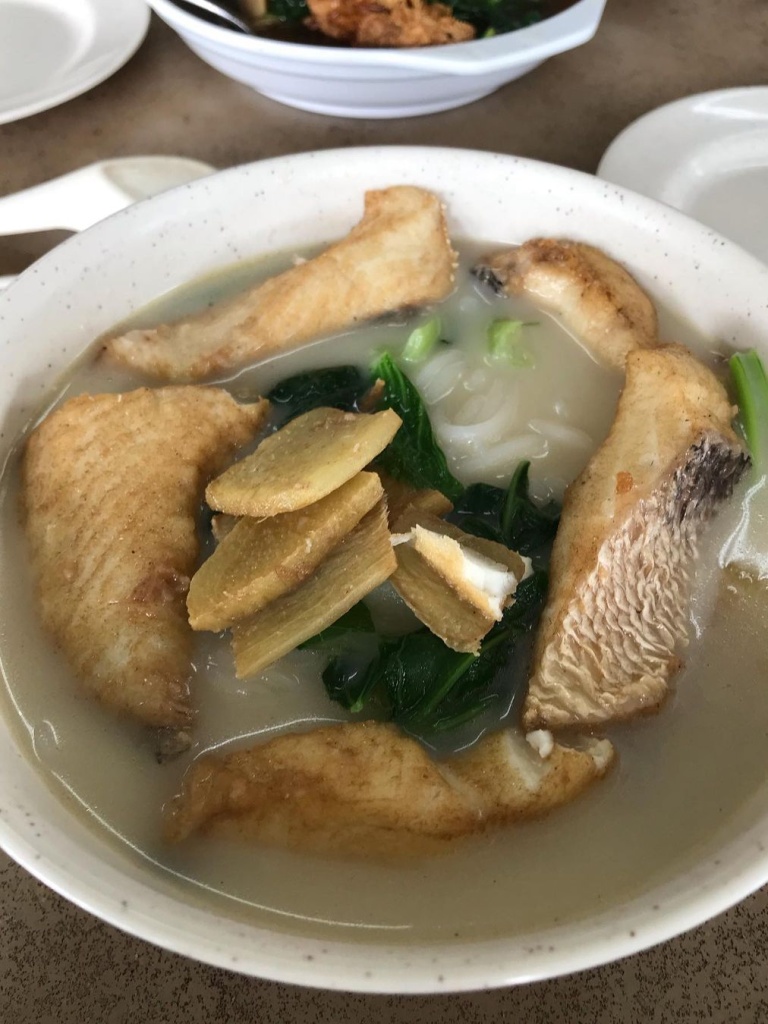
Why visit? Not to be confused with the original brand by the late Mr Loh Mun Hon, Hong Kong Street Chun Kee is a humble establishment that shares the same name. While it remains unclear if this stall was created by one of his disciples, what is certain is its knack for cooking Singaporean-style Cantonese dishes.
Renowned for its san lao hor fun, a dish featuring fried fish hor fun noodles, Hong Kong Street Chun Kee also boasts a remarkable fish soup, often hailed as one of the finest in Singapore.
Its affordability makes it a favoured spot for regulars,and makes for an ideal dining destinations for a family feast without breaking the bank.
Crowd favourites: The sum kee fish meat noodle soup (from S$7.50) delivers a broth that strikes a balance — clean and light, yet extremely flavourful. What sets it apart is the generous serving of thick fried fish pieces, complemented by tender and juicy choy sum vegetables. It serves as a comfort food for both rainy days and hangovers.
If you’re dining with others, opt for the cereal prawn (from S$24) to share, featuring sweet and savoury flakes atop fresh prawns.
Alternatively, the signature san lao hor fun (from S$6.50) is a favourite amongst regulars and worth the try.
4. Hong Kong Street Zhen Ji
158 Ang Mo Kio Ave 4, 01-590
Open: Monday to Sunday (11am to 2.30pm, 5pm to 10pm)

Why visit? Hong Kong Street Zhen Ji is owned by Tay Lian Chye and Chan Hon Mung, the latter having worked under the late Mr Loh Mun Hon, the founder of the original Hong Kong Street Old Chun Kee brand.
Located under HDB block, this casual eatery specialises in Singaporean-Cantonese-style zi char dishes and are known for that coveted wok-hey flavour in its fried creations, served up at remarkable speeds (for a zi char spot).
Given its popularity, it is advisable to call ahead and make a reservation to avoid prolonged wait times.
Crowd favourites: You might be spoilt for choice here with the sheer number of zi char offerings, but the sum kee fish meat noodle soup (from S$7.50) is a must-try. Think abundant portions of fish — fried and fresh — submerged in a luscious, savoury milk broth.
To share, get the sum kee prawn paste chicken (from S$12), which comes crispy and bursting with umami flavour.
5. Jin Hua Fish Head Bee Hoon
Old Airport Road Food Centre, 01-120, 51 Old Airport Road
Open: Sunday to Thursday (11.30am to 7.30pm), Friday (11.30am to 3pm, 5pm to 7pm), Saturday (11am to 9pm)
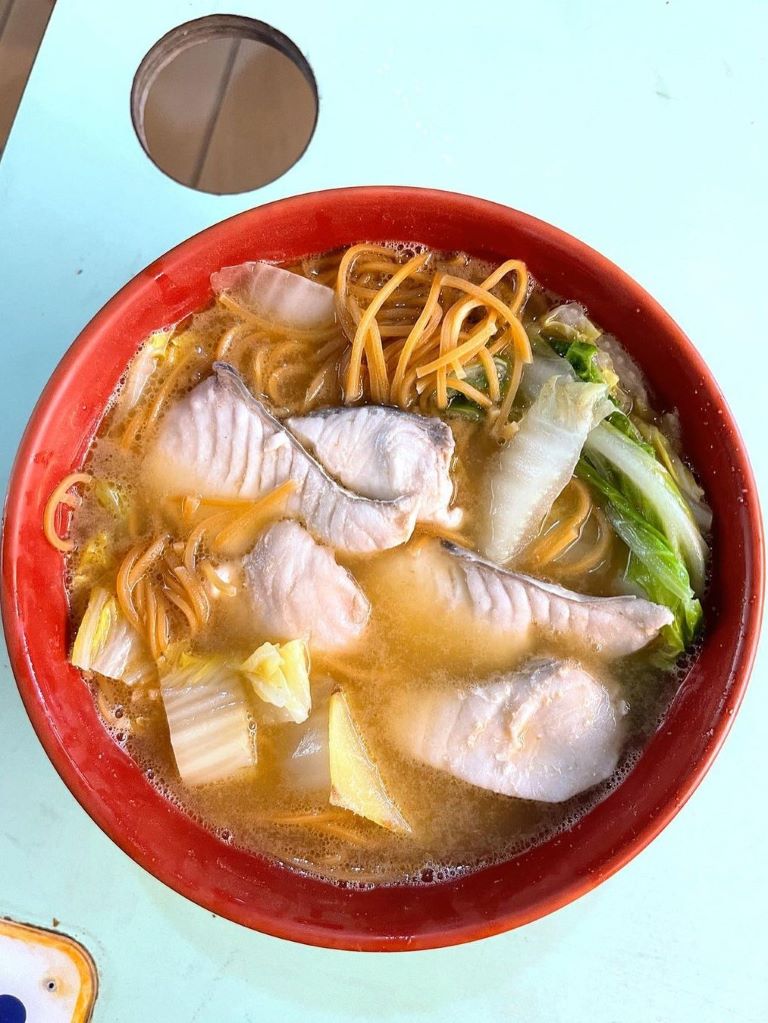
Why visit? Old Airport Road is a known food haven for many Singaporeans and Jin Hua Fish Head Bee Hoon may very well be one of the draws at this bustling hawker centre. It’s been around for more than 20 years and is one of the most popular stalls in the centre, with lines forming even during off-peak hours.
What sets it apart is the exceptional service. Despite long queues and the sweltering heat, the friendly owner politely takes orders, prepares each bowl individually to ensure consistent quality and goes the extra mile to explain each condiment.
While this translates to longer waiting times, the piping hot bowls made with passion are worth the wait.
Crowd favourites: The fried fish meat bee hoon with milk (from S$5.50) is the most popular choice here. With no MSG added, the dish relies on the full-bodied broth to carry it and comprises chunks of subtly sweet fried fish meat, with your noodle of choice.
For a lighter option, the sliced fish soup (from S$5.50) comes with firm and chewy batang (mackerel) fish. The stall also offers milk-free options for all their fish soup dishes, but it is recommended to savour it as it is.
6. Piao Ji Fish Porridge
Amoy Street Food Centre, 02-100, 7 Maxwell Road
Open: Friday to Sunday (11am to 3pm)

Why visit? Piao Ji Fish Porridge is only open four hours a day, three times a week, but remains a beacon for food enthusiasts and draws long queues throughout the weekend. While its prices lean toward the higher side for a hawker centre, the wait and extra couple dollars are said to be well worth it.
This popular stall is an astonishing 55 years old, first opened as a pushcart by Yar Choon Piow when he was 25. Unfortunately, with his health declining, it was announced in late 2023 that the 80-year-old was looking for a buyer to carry on his legacy, with the possibility of closure if no candidate is found.
Though it is unclear if they have found a buyer, the stall continues to operate and announces next-day closures on its Facebook page. So get on to Amoy Food Centre for a bowl, before it might be closed for good.
Crowd favourites: Get the Teochew-style fish soup (from S$7), a clean broth that is slightly turbid from hours of stewing, served with thickly sliced fresh fish pieces and leafy vegetables. The flavours are elevated with a tinge of sweetness from the dressing of fried shallots.
Its signature dish, the fish and prawn (from S$12) porridge, is not to be missed. It features batang fish slices and fresh prawns, steeping in a robust porridge broth made with pork lard, fish and vegetables for a bolder taste.
7. Blanco Court Fresh Fish Soup
Multiple outlets islandwide
Operating hours vary across outlets
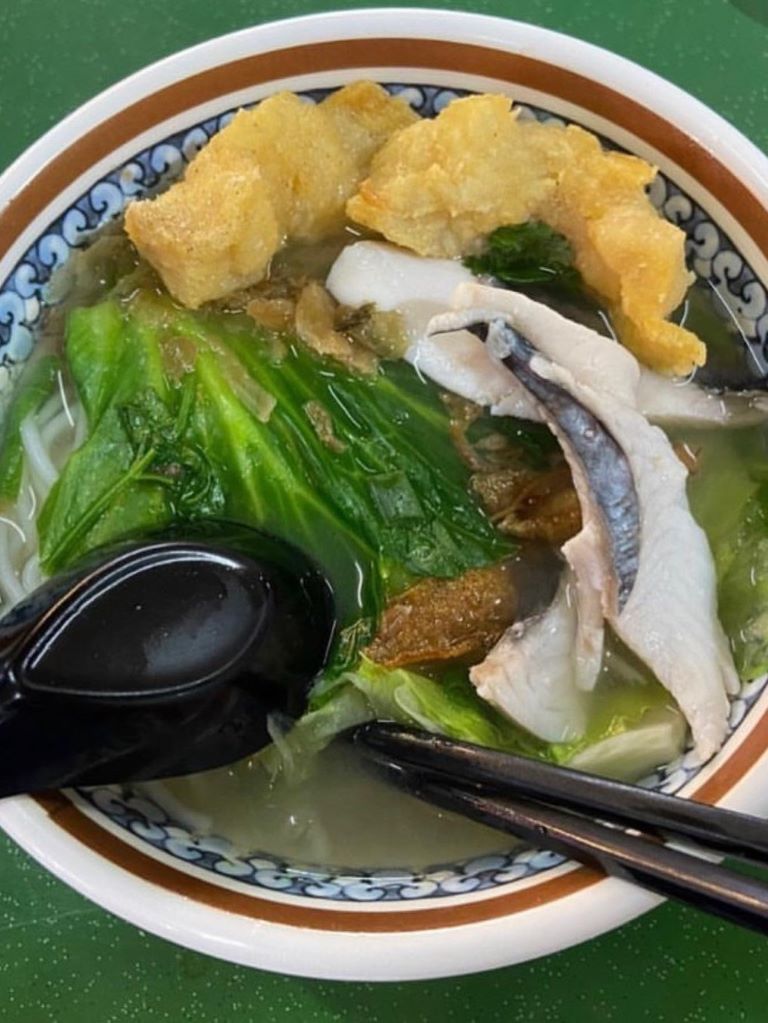
Why visit? Established in 1978, Blanco Court Fresh Fish Soup has been serving up fresh fish soup for almost half a century and is considered by many to be a nice fish soup in Singapore to head to when the craving hits.
They have six outlets islandwide, catering to residents of every corner of Singapore. The menu here spans both fresh and fried options to go with your fish soup, as well as tom yum soup for those looking for something with a little more spice.
Crowd favourites: While It’s not explicitly listed on the menu, the yuan yang, or double fish bee hoon soup (S$7.50) is the one to try and comes with a mildly sweet stock featuring both fried and fresh fish pieces. Insiders recommend elevating your fish soup with fried fish roe, subject to their daily availability.
Alternatively, get the sliced fish bee hoon (S$5.90) without milk. It is extremely savoury, thanks to the addition of preserved vegetables and fried sole fish, but the clear broth also allows the sweetness of the tender batang fish slices to shine.
8. Jun Yuan House of Fish
Multiple outlets islandwide
Operating hours vary across outlets

Why visit? At the helm of the renowned Jun Yuan House of Fish are siblings Jason and Tsering, who alongside their parents, embarked on this venture a decade ago with its maiden outlet at Old Airport Road. It went on to earn the Michelin Bib Gourmand in 2021 and 2022. At present, the second-generation hawkers operate a total of four outlets in the east, with hopes for islandwide expansion in the near future.
Crowd favourites: Get the XO fried fish soup (from S$6), a loving rendition of their grandparents’ traditional recipe. The XO fish soup features batang fish, cabbage and tomato slices in extra-umami soup. Tuck into this and you’ll understand how the stall managed to cinch a spot in the prestigious Michelin guide two years in a row.
Additionally, try its signature herbal seafood soup (prices vary) — the broth is prepared with pork, seafood, and a combination of angelica and polygonatum roots. Have your pick of dory (from S$6), batang (from S$8) and black grouper (from S$10) as your fish of choice, though the third option is most recommended.
9. Kwang Kee Teochew Fish Porridge
Newton Food Centre, 01-20, 500 Clemenceau Avenue North
Open: Tuesday to Sunday (11am to 8pm)
One Punggol Hawker Centre, 02-19, 1 Punggol Drive
Open: Monday to Sunday (10.30 am to 8pm)

Why visit? Kwang Kee Teochew Fish Porridge has been around since 1962 and its long legacy of Teochew fish soup was recognised in 2021 with a spot on Michelin’s Bib Gourmand list.
Previously located at the old Orchard Road carpark and run by an elderly couple, the stall moved to Newton Food Centre in the 1970s and is now run by their son Jason. HungryGoWhere also understands the second outlet in Punggol is run by Jason’s son, Adrian.
It’s known for its fresh and tasty fish soup, which is a result of hours of thoughtful preparation. The secret? Kwang Kee blanches the fish in water first, which minimises the fishy odour in the soup, and cooks it quickly in the fish broth before serving.
Crowd favourites: Get the dual fish soup (from S$7), which combines fried and fresh fish slices in a clean and flavourful clear broth, made from slow-cooking fish bones. It is finished with a dash of sole fish powder, giving the broth a pleasant aroma.
10. Angel Horse Teochew Fish Soup
Albert Centre, 01-95, 270 Queen Street
Open: Tuesday to Sunday (11am to 8pm)

Why visit? Situated in the Bugis locale, Angel Horse Teochew Fish Soup stands out for its affordable and straightforward approach to fish soup, despite its whimsical name. This 32-year-old fish shop in Bugis is a no-frills establishment that focuses solely on fresh fish, with no addition of milk, allowing the natural flavours of the fish to take centre-stage.
The perpetual queues are a testament to its popularity and the store frequently sells out hours before closing. Be prepared to wait upwards of 20 minutes.
Crowd favourites: The sliced fish soup (from S$5.50) is a simple dish, but is extremely value-for-money. Made from stewing mackerel fish bones, the broth is light yet flavourful, which allows for the thickly cut and fresh fish slices to shine. Those who also enjoy their greens will like the inclusion of bitter gourd, vegetables and tofu which add to the medley of textures and flavours.
11. Han Kee
Amoy Street Food Centre, 02-129, 7 Maxwell Road
Open: Monday to Friday (11am to 3pm)
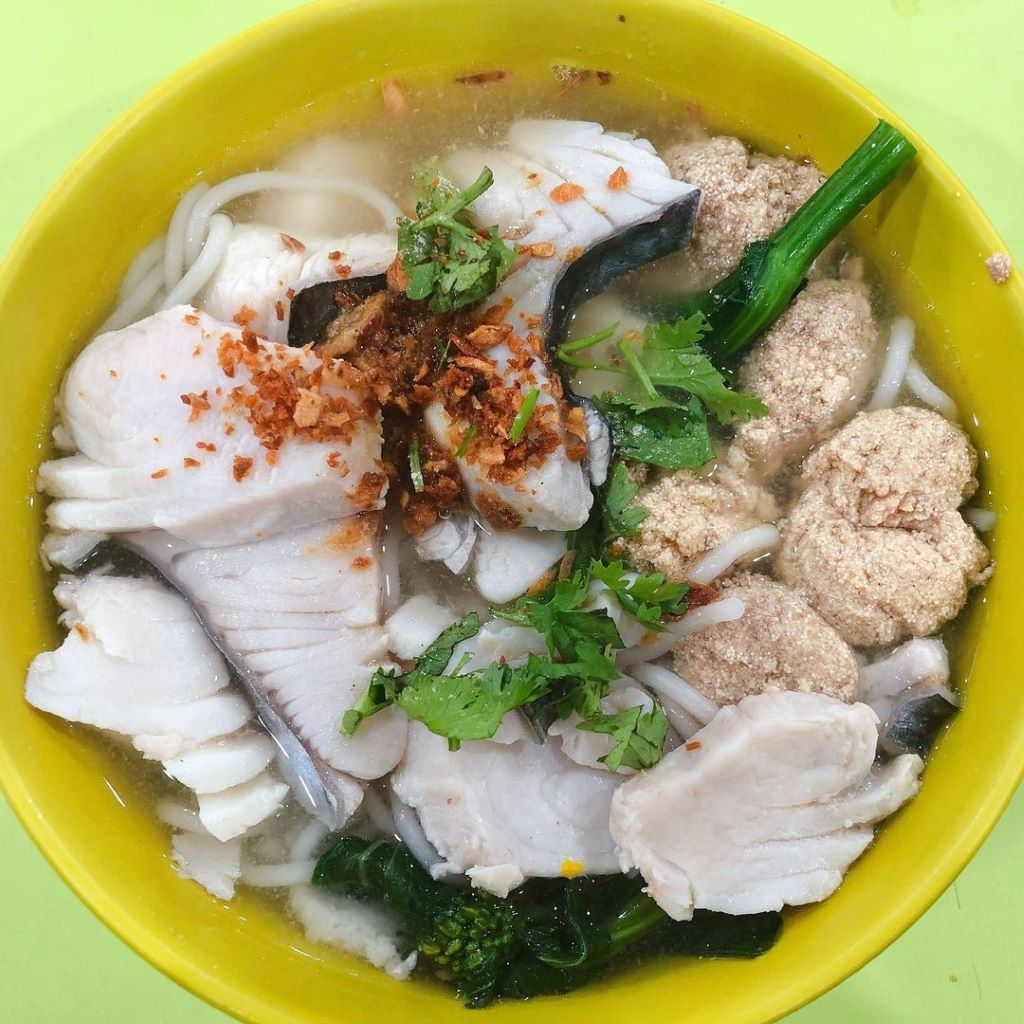
Why visit? Before you get the chance to see the fish stall itself, you’d first notice a snaking queue of patrons in line for Han Kee Fish Soup. It boasts the longest line in Amoy Street Food Centre, especially during meal times.
Hungry patrons, don’t be deterred by the lengthy queue as the line moves swiftly, thanks to the hawker auntie’s efficient ordering system and sharp memory. Dubbed by many as the best fish soup in Singapore, it’s worth venturing down for a try.
Crowd favourites: If there’s one dish to try out of this list, it is Han Kee’s sliced fish soup (from S$5) with a bowl of white rice. They don’t skimp here — the bowls come brimming with firm yet tender fish soup pieces, a sign of freshness. The soup, light and clear, topped with fried garlic, is as simple as it is, but feels extremely nourishing and wholesome.
12. Hot Spot Cafe Restaurant
Burlington Square, 185 Bencoolen Street
Open: Sunday to Friday (11am to 4pm)

Why visit? Nestled in Burlington Square, Hot Spot Cafe Restaurant is a favoured casual lunch-time eatery, spotting snaking queues during weekday afternoons. It offers a variety of noodle dishes that are highly customisable, with a total of nine noodle options for every kind of slurper or occasion.
Hot Spot is also known for having one of the best tom yum fish soups in Singapore, boasting a rich and full-bodied stock, perfect for spice lovers.
Crowd favourites: Get the double fish (S$7.50) soup, served with slices of fresh and crispy fried fish, accompanied by a medley of vegetables, tofu and egg floss.
We recommend having it with ee mian noodles and the spicy and aromatic tom yum soup for the best flavour combination. Fret not non-spice eaters, as the shop also has a clear soup base that goes great with thick bee hoon.
13. Lin Ji Fish Soup and Porridge
Boon Lay Market & Food Centre, 01-195, 221B Boon Lay Place
Open: Tuesday to Sunday (8am to 2pm)
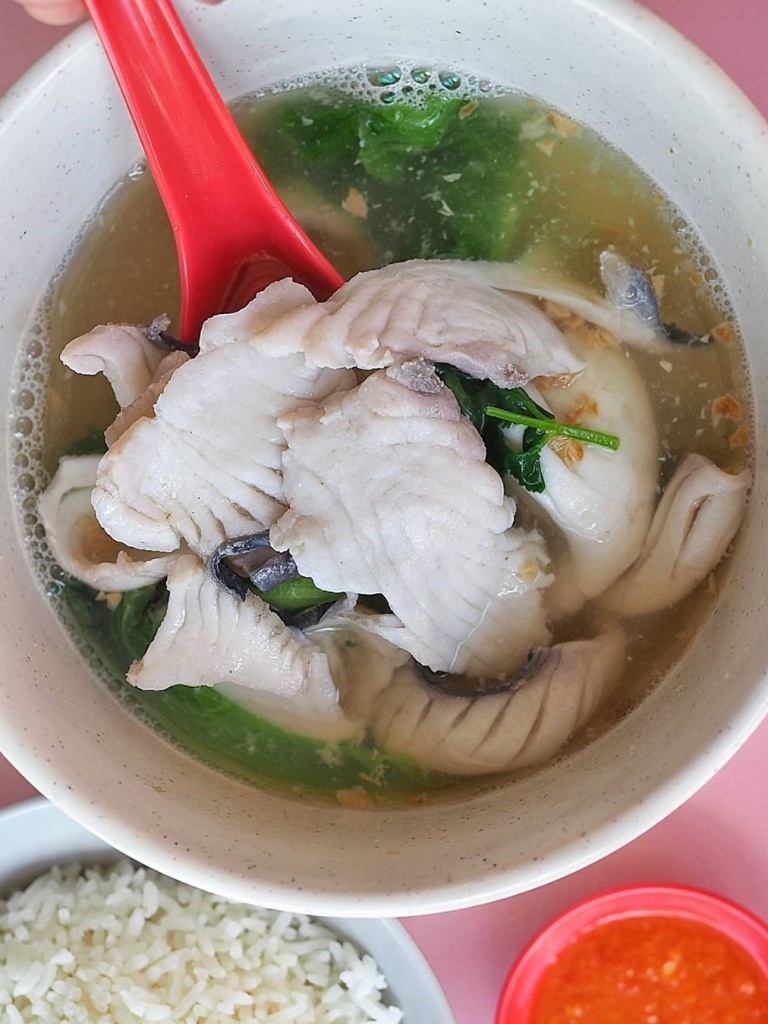
Why visit? Lin Ji Fish Soup and Porridge is a hidden gem in the west side of Singapore. This down-to-earth stall features friendly service and a focused menu revolving fish soup. Despite its low-key status online, it’s popular among nearby residents and draws a strong following of loyal customers.
Operating only in the mornings til mid afternoon, it’s the perfect spot for those seeking a wholesome fish soup fix early in the day.
Crowd favourites: Get the sliced fish soup (S$6), an economic option that features thick slices of fresh fish immersed in a clear and flavourful broth, leafy greens, fragrant fried garlic tomatoes and coriander.
If you’re feeling spendy and love your fish, its red grouper sliced fish soup (S$10), which features mildly sweet tender flesh, is also a hot favourite.
14. Arcade Fish Soup
Multiple outlets islandwide
Operating hours vary across outlets

Why visit? Located in the heart of CBD, the OG Arcade Fish Soup is a popular spot for office folk looking for a healthier lunch option.
It first opened in 1998 in The Arcade, giving rise to its name, and now has four outlets, namely in the CBD area, serving the same fish soup along with freshly made chilli to complete.
During mealtimes, the queues can grow especially long, so we recommend that you visit during the off-peak hours to enjoy a more leisurely bowl.
Crowd favourites: The amount of ingredients in the mixed fish soup (S$7.50) makes up for its steeper price. With two types of fish, pickled mustard, cabbage, tomatoes and tofu, this dish is a hearty, flavourful combination sure to satiate any appetite.
For more comforting food options, visit the newest viral Japanese dessert and drink shop Warabimochi Kamakura or grab some instant noodles at the latest Wong Fu Fu x Nongshim pop-up.
Blanco Court Fresh Fish Soup, Jun Yuan House of Fish, Kwang Kee Teochew Fish Porridge and Arcade Fish Soup are on the GrabFood Delivery Service and offer free delivery (up to S$3 off) with GrabUnlimited.
Check out amazing deals on the GrabFood Dine-in service.
Alternatively, book a ride to these places for fish soup in Singapore.




